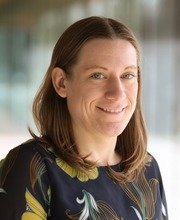
BA, Skidmore College
MA, PhD, Boston University
Postdoc, Argonne National Laboratory
Sarah Soltau joined the Department of Chemical Sciences in the Fall of 2016. She teaches General Biochemistry I & II, General Biochemistry I Laboratory, Chemical Principles I & II, and Survey of Chemistry I & II. Her research interests are in electron transfer in metal containing proteins with multiple applications. Her work uses a wide variety of molecular biological, biochemical, and analytical techniques to analyze these electron transfer systems. One of these projects produces solar fuel production devices through appending small electron transfer proteins with synthetic hydrogen evolution catalysts and light-absorbing molecules called photosensitizers. The protein environment serves as an electron relay to shuttle electrons from the photosensitizer to the catalyst to produce hydrogen as an alternative fuel source. Dr. Soltau’s research characterizes the protein-catalyst hybrids by UV-visible, fluorescence, and atomic absorption spectroscopies and analyzes the products of the photochemical reactions by GC-MS and HPLC. Another project characterizes protein – protein interactions and electron transfer within a protein complex, 3-ketosteroid-9α-hydroxylase (KshAB), which is involved in the steroid metabolism of a pathogenic bacterium, Mycobacterium tuberculosis the causative agent of tuberculosis. This project examines electron transfer via two different domains of the KshAB protein using enzyme activity assays, size-exclusion chromatography, and site-directed mutagenesis. Dr. Soltau mentors undergraduate students in research and encourages students to present at conferences and develop their own interests in the sciences.
Biochemistry, Bioinorganic Chemistry, Metals in Biology, Protein Electron Transfer, Photochemical Hydrogen Production, Protein-Protein Interactions